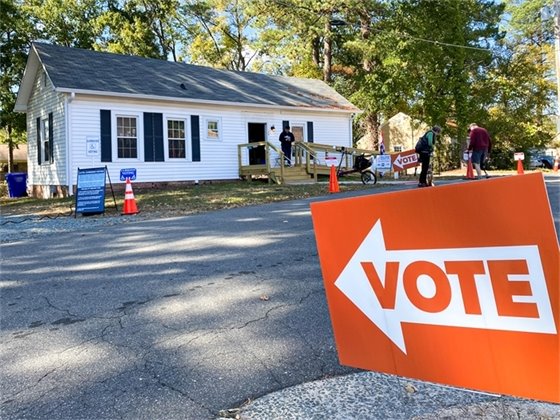Now that the 2024 election is in the books, attention has turned from campaigning to analyzing, with commentators weighing in on why Americans voted the way they did. As per usual in every presidential election, the winning party is claiming their victory proves Americans will be on their side for the next generation, while thought leaders on the losing side are calling for massive shifts in messaging and priorities and focus. But is any of that warranted? Or is the real reason for this month’s outcome a little more mundane?
97.9 The Hill’s Aaron Keck recently spoke with Tom Jensen, the director of Public Policy Polling, a national polling company based in Raleigh that predicted this year’s outcome with a high degree of accuracy.
Click here to listen to their full conversation. The transcript below has been edited for clarity.
Aaron Keck: Every time an election rolls around, there’s always a lot of handwringing and consternation about whether the polls are accurate. How did the polls do this year?
Tom Jensen: It was really a pretty good year for the polls, and I think people who listened to our discussions on your show over the last four months had a good idea of what was coming. I remember we had a discussion right after the Democratic Convention about how, rather than getting the bounce that you usually get coming out of your convention, it was actually Trump who was seeing an improvement. And then we also talked in October (about how) it seemed possible that Trump was going to win the popular vote: we were seeing in places like New Jersey and Florida that Trump was doing nine points better than he did in 2020. So I hope we gave your listeners a good idea of what was happening over the course of the race.
Keck: I enjoy talking to you because we talk (not only) about poll numbers, but also about the underlying analysis: how to read a poll, and how to understand news coverage of polls. And one of the things that stood out (this year) was the uncertainty heading into the final weeks of the election: if polls are showing a tied race, there’s not a whole lot more you can glean (from them) in terms of who’s going to win: polls are going to be off slightly, a little bit to the left or right, and we won’t know which until Election Day. Having that perspective helps – as opposed to what people thought in 2016, which is, “Well, the polls are showing Hillary Clinton up by two points, so that guarantees she’s going to win.”
Jensen: And (that was) the very discussion that we had two weeks ago: (polls showed) the race was more or less tied, and if the polls underestimated Kamala by two points, she would win all the swing states, and if the polls underestimated Trump by two points, he would win all the swing states. And that’s what happened.
Keck: Turning now to analysis: I’ve seen lots of folks weighing in with their thoughts on why the election swung the way that it did. And in general, you can summarize all those together in one sentence, which is: “whatever I’ve been saying the Democrats should be doing more of, that’s why they lost.” People who’ve been complaining about the Democrats being too far to the left, they’re saying the Democrats were too far to the left. People who’ve been saying the Democrats are too far to the right, think the Democrats were too far to the right. But everyone thinks they were right all along, and the Democrats should have listened to them the whole time.
Somewhat more objectively: what do you think the Democrats did wrong, or the Republicans did right, this year?
Jensen: I don’t even know if it had that much to do with anything the Democrats or the Republicans did. I think it just comes down to (the fact that) President Biden was really unpopular, and when the president’s unpopular, (people) vote for the other party. You could (ask) why it’s President Biden’s fault that he’s so unpopular, (but) I don’t know if there’s much he could have done differently over the last four years that would’ve made him more popular. I think the country was already a pretty cranky country, and then going through COVID made us an even crankier country, and I think that people just weren’t going to be happy with who was in charge.
And the silver lining of that for Democrats is, I don’t see that changing. I don’t think this was some sort of huge endorsement of the Republican Party, this election outcome. I don’t think it’s any sort of permanent shift in American political allegiances or anything like that. I think now that Republicans are in charge, everyone’s going to hate them, just like everyone’s been hating Democrats over the next four years. So I’m close to 100 percent confident that Democrats will get back control of the House in 2026. I think Democrats will win a U.S. Senate race in North Carolina in 2026, for the first time in 18 years. And then there’ll be a lot of good (Democratic presidential candidates) in 2028, and I have a feeling that whoever emerges from that is going to end up beating JD Vance, very similar to the victory that Donald Trump had this month.
Keck: I appreciate that you assume it’s going to be JD Vance on the Republican side.
Jensen: I could be wrong about that – (but) I will say, I think it’ll be JD Vance unless it’s someone else named Trump.
Keck: So what, then, is your message to the Democratic Party for the next two years? Do they have to change their messaging? How much do they have to do it? What will they have to do to position themselves to do better in 2026 and 2028?
Jensen: I do have (one) overarching criticism of the Democrats: they’re not good at communicating to people who aren’t political junkies. They need to not (focus on) what’s going to appeal to the median MSNBC viewer, and instead come up with ways of getting their message out that do reach these people that Republicans are doing a much better job of getting to right now. Project 2025, for example: if you have to explain to people what something is (before you) try to get them mad about it, that’s too complicated for core messaging. I think every dollar spent on fearmongering about Project 2025 was a waste. It’s reminiscent of the 2014 midterm, when Democrats decided their whole message was that the Koch brothers were bad, and nobody even knew who the Koch brothers were. Similarly, (focusing on) Liz Cheney’s support for Kamala Harris – that’s the kind of thing that political junkies might think is really compelling, (but) it’s totally meaningless to the more marginal voters who Democrats struggled with this time around.
So that would be my biggest prescription: get out of your bubble, realize that almost everybody who works in politics is a weirdo, in terms of their level of interest and knowledge, and do a better job of connecting with the lower-information voters who actually decide who wins from election to election.
Photo via the Town of Carrboro.
Chapelboro.com does not charge subscription fees, and you can directly support our efforts in local journalism here. Want more of what you see on Chapelboro? Let us bring free local news and community information to you by signing up for our newsletter.



